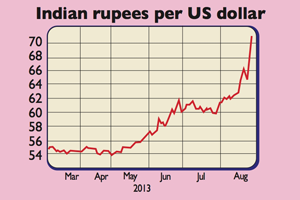
India continued to bear the brunt of the emerging-market sell-off this week. On Tuesday, the rupee slid by around 3% against the dollar, its worst one-day drop in 18 years. On Wednesday, it fell even further, reaching a new record low of almost 70 to the dollar. The currency has lost around 15% against the greenback this month and a quarter since early May. The benchmark Sensex stock market index has slid by almost 7% this month.
What the commentators said
“While the world was watching for an emerging-markets crisis to erupt in China,” said Morgan Stanley Investment Management’s Ruchir Sharma in the FT, “it erupted in India instead.” The eventual end of easy money in the US makes emerging markets look riskier, while the good times had allowed investors to ignore vulnerabilities such as a large current account deficit and its fiscal counterpart.
The latter was in focus this week. The government passed a Food Security Bill. It will sell subsidised wheat and rice to the 1.2 billion-strong population. This revived fears that the government “will be tempted to launch a flurry of fresh populist spending ahead of elections” due by May 2014, noted Swati Bhat of Reuters. The plan is to keep the fiscal deficit to 4.8% of GDP this year, but doubts are growing. According to Kotak Institutional Equities, the subsidies could cost a third more than foreseen.
The broader point, however, is that if you are trying to shore up confidence and stop capital fleeing your country, the last thing you should do is stoke fears that you can’t budget properly. Following clumsy and counterproductive measures to stem the outflow last week, faith in the government is dwindling rapidly. “The ineptitude, brazen populism and lack of appropriate policies… is the largest part of the problem,” said Surjit Bhalla of Oxus Investments. “You really get the feeling that no one is in control.”
This crisis will pass, said Sharma. But don’t expect a “meaningful turnaround” in India’s fortunes until a new government is in place.
• Stay up to date with MoneyWeek: Follow us on Twitter, Facebook and Google+